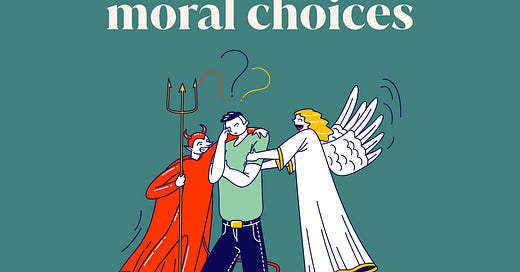Welcome to my Friday edition of Substack, which features my paid posts: Inside the Wonder World.
Those paid subscribers who stick with me for a year will get a free copy of the book as soon as it’s out.
This week’s lesson is free to all.
Inside the Wonder World is the working title of my developing craft book on writing and publishing for young readers. I’m bringing it to you in pieces, both to help you learn something more deeply (lessons and exercises included) and to push me to finish this lofty goal.
Here’s the next lesson!
What Are Moral Choices?
Every protagonist must have some kind of moral compass.
We all make choices in life. Sometimes those choices benefit others, and sometimes they are selfish. Generally, we call choices that benefit others, especially if they sacrifice the self for the other, good moral choices; we usually call choices that are driven by selfish motives bad moral choices. We respect people who make good moral choices.
There is also a large gray area for those choices, as we’ll see.
Especially in kidlit, we want to create likeable characters. They may not be perfect (in fact, they do need flaws, right?), but at some level readers want to like your protagonist. If you recall, one of the first things we looked at with regard to what readers want is:
· Someone they like – or at least someone they want to spend a lot of time with. A character can be flawed but must be sympathetic – and she must be redeemable.
Good moral choices can show that sympathetic, likeable side to a protagonist.
Bad or poor moral choices can also show the dark side of character – poor moral choices, and especially when they are in opposition to a positive moral compass, can bring protagonists dangerously close to failure.
Bad moral choices are a given for the antagonist.
In Where the Wild Things Are, Max acts rudely and is punished by being sent to bed without supper. That’s a moral platform wherein rudeness is not tolerated but is punished in a certain way. In The Hunger Games, Katniss acts selflessly when she volunteers and is rewarded by being treated to really great food, a complete makeover, and training. That’s a moral platform rewarding sacrifice (while undermining the whole notion by pitting children against one another, a gray area for sure.)
Moral choices are driven by things we “know” from birth, and from the things we learn as we grow. Putting your character in a situation in which they must make a choice (which you should be doing throughout your story) forces them to confront both the belief systems they were born into and the ones they build as they grow. We’ll call these their “moral platforms”.
Things get really interesting in any story (as in life) when those platforms are in opposition, which is part of that gray area. That is to say, when the moral platform established for you as a small child comes into opposition with the moral platform you establish for yourself as you mature.
But first let’s break it down and look at each of these platforms in turn.
Belief Systems from Birth
Unless you were born on a mountaintop and lived alone your entire life, you were influenced by the moral codes of your parents, extended family, and community. Even Romulus and Remus were given a wolfish moral code that created their first moral platform, and honestly, that mountaintop all by itself would have built a moral platform in you that was geared toward your survival.
Belief systems are the most obvious kinds of platforms. Religions of all stripes have “dos and don’ts” by which adherents live, the Ten Commandments being the most obvious of these. Adhere to these codes or you will lose something: expulsion or banning from the community; no life after death; banishment to hell.
Your character is born into some kind of belief system that will provide them their first moral code platform, and you need to know what that is, even if it is mild and not something that impacts their daily lives or your story in a big way.
This is because that platform is a part of who they are and will influence their choices at every turn.
Exercise:
1. What kind of “religion” was your character born into and experienced for at least the first 5-10 years of life? Is there a deity or deities involved, and if so what kind (i.e., autocratic, benign and loving, pantheistic, etc.)
2. What are the moral codes of that religion? Detail them as a list of “dos and don’ts”.
3. What are some of the parental codes in your story? For example, what is punished or praised, and how? Detail them in a list.
4. What about community codes? Punishments and rewards for those? Think about things like: awarding medals for valor; increasing rank for good service; putting someone in the stocks; having someone wear a scarlet letter; etc.)





